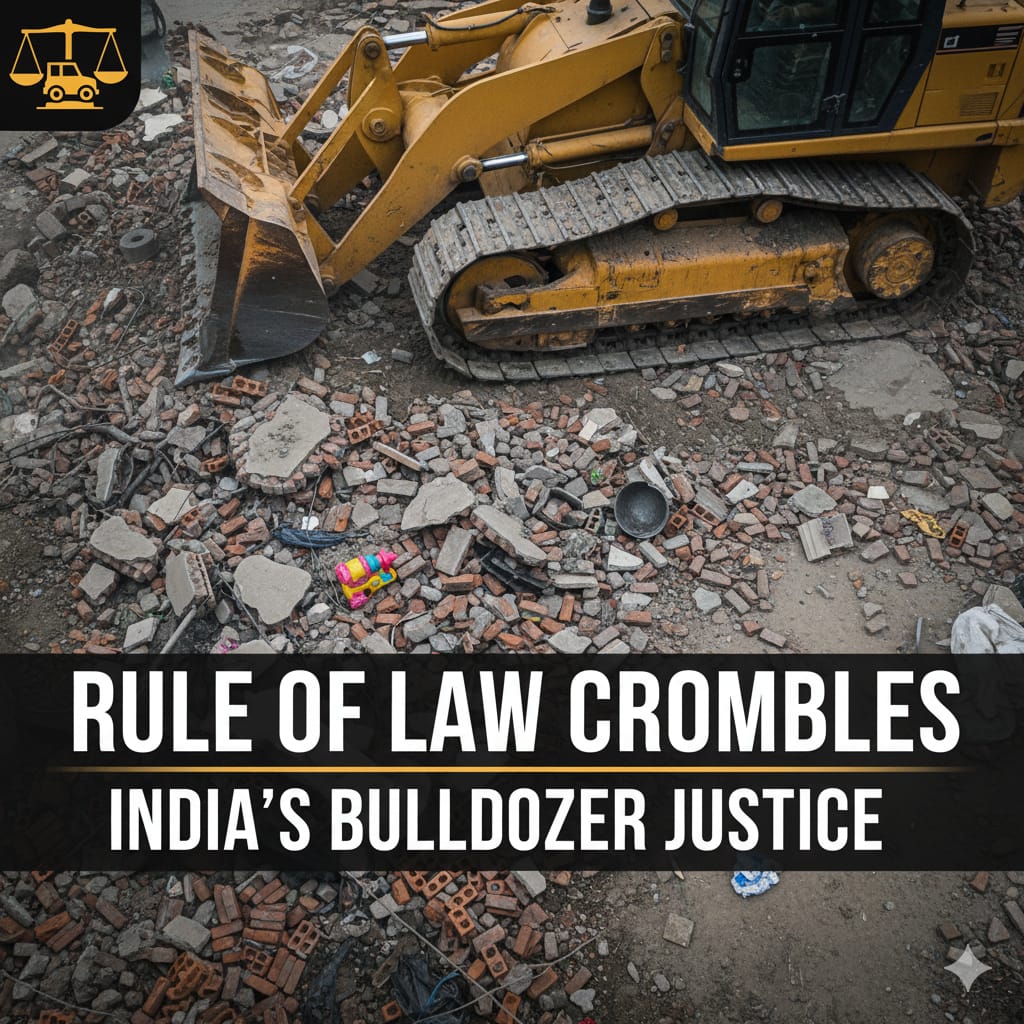
The recent pronouncements by Chief Justice of India, Justice B.R. Gavai, serve as a vital reminder of India’s democratic conscience. His declaration “that the nation is governed by the rule of law, not by the rule of the bulldozer” reaffirms the constitutional principle that protects every citizen. Yet this judicial ideal stands in sharp contrast to a growing ground reality, where swift, non-judicial demolitions have become a visible and often punitive tool of executive power.
Popularly dubbed “bulldozer justice,” this practice does more than destroy homes. It inflicts deep psychological wounds, eroding public trust in democratic institutions. When the protective shield of legal procedure is replaced by the brute force of state machinery, the very foundation of constitutionalism begins to crumble.
The Breach of Due Process: A Systemic Failure
The judiciary has consistently upheld that every citizen, regardless of accusation, is guaranteed due process. This includes the right to a fair hearing, adequate notice, and judicial scrutiny of any action that deprives them of their fundamental right to shelter—protected under Article 21 of the Constitution.
However, in practice, demolition drives often bypass these constitutional safeguards altogether. Instead of following the stipulated legal procedure which mandates serving a written notice at least fifteen days before demolition and providing a genuine opportunity to respond—authorities frequently act with little more than a cursory warning, sometimes scribbled on the structure itself.
The Supreme Court has repeatedly intervened, issuing detailed guidelines and condemning such demolitions. In landmark rulings, the apex court has described these actions as “high-handed and illegal,” even ordering states like Uttar Pradesh to compensate victims, in some cases up to ₹10 lakh per affected household, for unconstitutional use of force.
Punishment Without Conviction: The Facts on the Ground
The scale of these demolitions exposes the magnitude of constitutional violations.
1- Mass Displacement: Reports indicate that between January 2022 and December 2023, nearly 740,000 people were displaced by state-led demolitions. In 2023 alone, over 515,000 individuals lost their homes—families reduced to homelessness under the rubble of administrative action.
2- Retributive Targeting: These actions often shed the pretence of being anti-encroachment drives. They follow communal disturbances or protests, targeting the houses and shops of individuals merely accused of crimes. This transforms administrative enforcement into extrajudicial punishment, violating the fundamental legal principle that a person is innocent until proven guilty.
3- Collective Punishment: By destroying the home of an accused person, the state punishes entire families such as children, elders, and relatives unconnected to any alleged crime. This collective retribution defies judicial proportionality, contravenes human rights norms, and undermines the spirit of a welfare state.
The Psychological Havoc: Erosion of Trust and Freedom
The bulldozer’s most devastating damage is not physical but psychological. It breeds a quiet, persistent fear, especially among marginalized communities who are disproportionately targeted.
A- Chilling Effect on Dissent: When a person’s home—the ultimate symbol of safety and belonging—can be destroyed overnight, dissent becomes dangerous. The message is unmistakable: compliance is safe; defiance carries a personal cost. Such fear corrodes the freedoms of expression and participation that sustain democracy.
B- Loss of Faith in the State: Bulldozer justice dismantles the separation of powers by turning the police and municipal authorities into accuser, judge, and executioner. Citizens find themselves with no refuge in law. This spectacle of “might is right” replaces constitutional order with intimidation, deepening the public’s loss of trust in the state’s promise of fairness.
C- rauma and Instability: The sight of a family’s life reduced to dust is not just destruction—it is trauma. It fractures social stability by disenfranchising large sections of the population, reminding them that their right to shelter depends on silence or submission.
Restoring Faith in Constitutional Governance
The judiciary’s strong stand against the rule of the bulldozer is both a moral and constitutional defense of democracy. Yet the real test lies with the executive. India’s democratic integrity now depends on whether those in power can abandon the politics of summary punishment and recommit to governance grounded in law and due process.
A nation cannot build justice on the ruins of its own Constitution. True strength lies not in the speed of the bulldozer, but in the steady, impartial hand of the law.





















